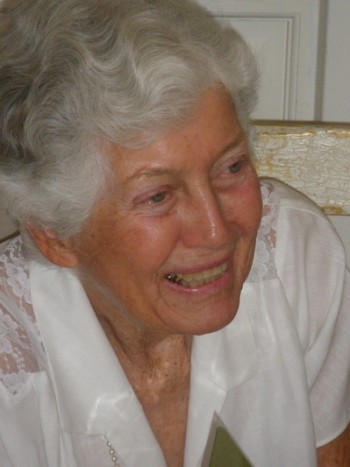In the Garden With the Hollyhocks
This is my mother-in-law, Nancy. Isn't she pretty? She's also smart, well-read, perceptive, and dignified, one of the people I look to for wisdom and example. She's fit, too. At the age of 86, she still swims three times a week, maintains a meticulously tidy home, and works hard outdoors -- tending to the orchard, gardening, maintaining the irrigation system...a whole range of tasks that are physically demanding and require an impressive knowledge of how everything works. My conversations with Nancy are usually on the run, a few words with the mail, or looking up from the roses.
But here is an early childhood memory she shared with me recently, an anecdote I have held onto like a small shiny stone ever since.
It was 1930 perhaps, and she was four or five, and it was evening, but she had wandered outside, and although she knew she was supposed to stay behind the gate, someone had left it open, and she walked right through it, beyond the zone of home. She came upon a garden with tall hollyhocks. She remembers how they looked in the moonlight, and the fragrance of the air. Most of all there was a startling sense of having stepped out into the world apart from the others for the very first time, and just being for a moment Nancy alone, whoever she was. That's all.
It was exhilarating, delicious, a little bit scary...the beginning of the consciousness of self, of being a separate self, and of being alive.
To borrow Annie Dillard's words, it was the moment when Nancy, as all children do, "slid into herself, perfectly fitted, as a diver meets her reflection in a pool."
The memory was in fact prompted by a reading of Annie Dillard's An American Childhood, and this seems a good junction at which to share a passage from that book:
What does it feel like to be alive? Living, you stand under a waterfall. You leave the sleeping shore deliberately; you shed your dusty clothes, pick your barefoot way over the high, slippery rocks, hold your breath, choose your footing, and step into the waterfall. The hard water pelts your skull, bangs in bits on your shoulders and arms. The strong water dashes down beside you and you feel it along your calves and thighs rising roughly backup, up to the roiling surface, full of bubbles that slide up your skin or break on you at full speed. Can you breathe here? Here where the force is the greatest and only the strength of your neck holds the river out of your face. Yes, you can breathe even here. You could learn to live like this. And you can, if you concentrate, even look out at the peaceful far bank where you try to raise your arms. What a racket in your ears, what a scattershot pummeling! It is time pounding at you, time. Knowing you are alive is watching on every side your generation's short time falling away as fast as rivers drop through air, and feeling it hit.
But if you listen to a memory of someone from the generation before you, you can add their song to the racket of time's pounding. You can hold it for a little while longer. You can pass it along if you want.
